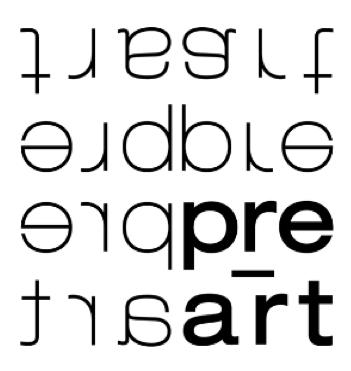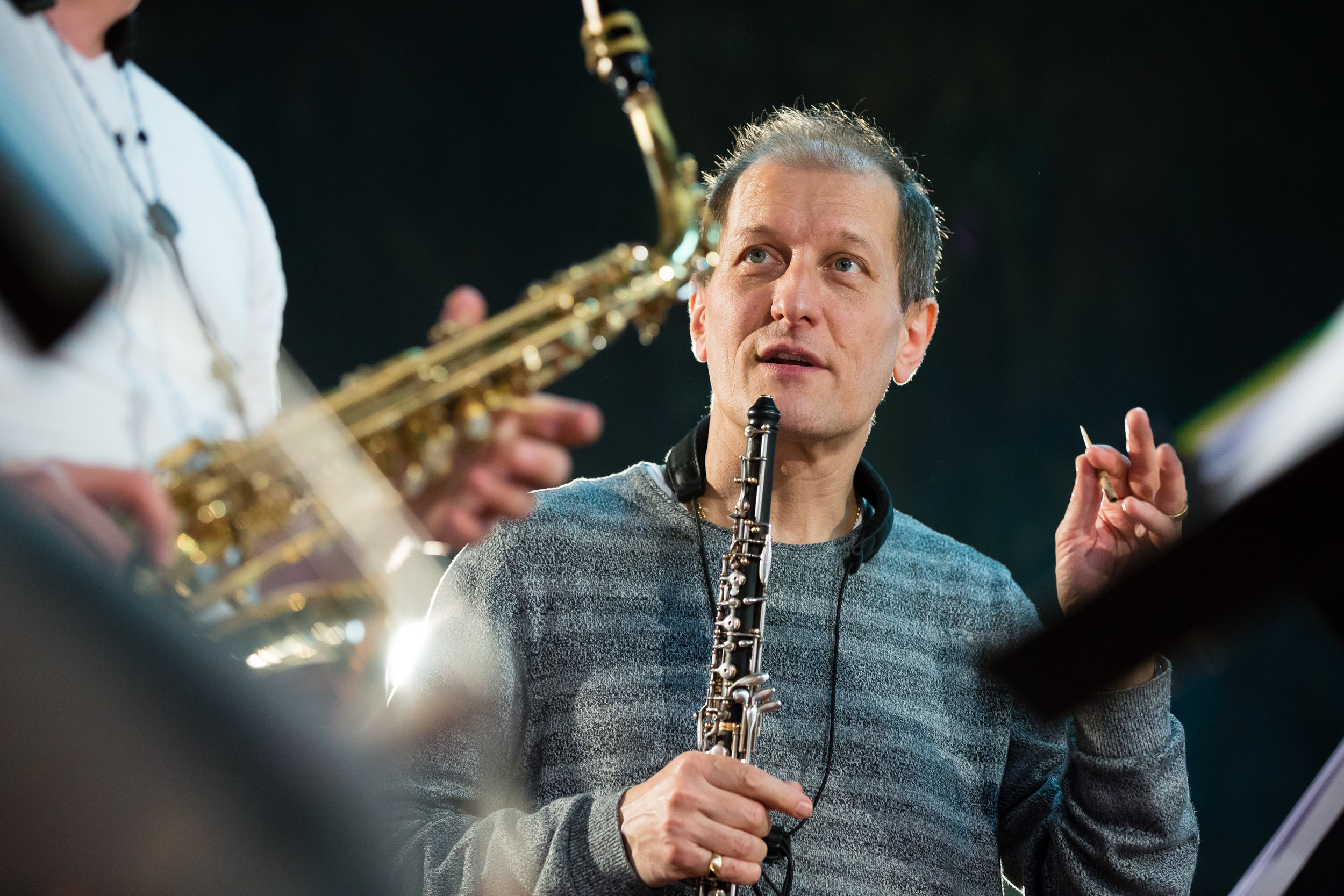who are we and what do we do?
pre-art promotes excellence by featuring rarely performed musical works, creating ensembles, sponsoring a competition for composers and by organizing tours and master classes within Southeast Europe and the Caucasus. All projects follow the principles laid down in our charta.
pre-art is a nonprofit-organization funded both publicly and through donations from foundations and private sponsors.
pre-art's historical approach connects the traditional and the contemporary. This is why pre-art focuses on young artists, especially young musicians.
pre-art goes to the aesthetic boundaries and opens up new artistic pathways.
pre-art confronts urban centers with the regional periphery, the cultural mainstream with marginal areas. We believe that the marginal has the power to expresses what is essential to a culture precisely because it is not subject to the standardization of the mainstream.
pre-art was founded in 2001 by Matthias Arter, oboist and composer, and by Boris Previsic, flutist and university professor for cultural and literary studies – this broad background assures a constant flow and cross-fertilization of theory and practice, reflection and performance, analysis and experience.
pre-art fördert marginalisiertes und zugleich qualitativ hochstehendes Kunstschaffen mit eigenen Projekten unter anderem mittels Ensemble-Aufbau, pre-art-Kompositionswettbewerb, Tourneen und Meisterkurse in einem erweiterten Südosteuropa. Die Projekte folgen unserer Charta.
pre-art ist ein gemeinnütziger Verein, der sich aus öffentlichen wie aus Stiftungs- und Gönnergeldern finanziert.
pre-art verbindet die Tradition mit der Gegenwart und Zeitgenössisches mit seiner Geschichtlichkeit. Die Förderung junger KünstlerInnen, vorab MusikerInnen, bildet darum einen Schwerpunkt in der Arbeit von pre-art.
pre-art lotet ästhetische Grenzen aus und ermöglicht so neue künstlerische Wege. pre-art konfrontiert das Zentrum mit der Provinz, das vermeintlich Allgemeingültige mit dem so genannt Randständigen, das in seiner Differenz zum Etablierten das Wesentliche unserer Kultur ausdrückt.
pre-art wird seit 2001 von Matthias Arter, Oboist und Komponist, und Boris Previsic, Flötist und Professor für Kultur- und Literaturwissenschaft, betrieben – das Kunstschaffen wird reflektiert und die Reflexion ästhetisch gerahmt.
Biography Matthias Arter
Matthias Arter, oboist and composer, studied in Zurich (in the classes of Peter Fuchs and Thomas Indermühle) and Freiburg im Breisgau (in the class of Heinz Holliger). He quickly established himself as a chamber musician and soloist specializing in contemporary music. He teaches at the Music University Berne and as Oboe Coach for Lucerne Festival Academy, and is principal oboe of the Basel Chamber Orchestra as well as the CNZ (Collegium Novum Zurich). In addition, he is the is the artistic director of several ensembles and projects such as aequatuor and pre-art. He has also dedicated himself to the scientific study of interpretation based on historic recordings.
In 2009, his portrait-CD with his own works written between 1993 and 2006 was published on NEOS-records. Arter’s compositions include chamber, vocal and orchestral pieces. In 2013 he wrote the first concerto for the lupophone, a new bass oboe that he promotes very actively. As a soloist he has performed at numerous festival such as the Lucerne Festival, Biennale Zagreb, Migros Classics, Festival Archipel, and World Music Days. He appears on the following labels: ECM, Sony Classics, en avant records, col legno and pre-art music.
For more information:
www.matthiasarter.ch
Der Oboist und Komponist Matthias Arter wurde 1964 in Zürich geboren. Nach Studien in Zürich (Peter Fuchs und Thomas Indermühle) sowie in Freiburg im Breisgau (Heinz Holliger) etablierte er sich rasch als Kammermusiker und Solist, wobei er der zeitgenössischen Musik stets einen besonderen Stellenwert gab. Heute ist er Dozent an der Hochschule der Künste Bern, Solooboist im Kammerorchester Basel, Oboe Coach der Lucerne Festival Academy und Mitglied des CNZ (Collegium Novum Zürich). Ausserdem trägt er die künstlerische Verantwortung für verschiedene Ensembles und Projekte wie Many Many Oboes oder pre-art und betätigt sich im wissenschaftlichen Feld der Interpretationsforschung auf der Basis historischer Aufnahmen.
2009 erschien bei NEOS eine Portrait-CD mit Solostücken, die Arter zwischen 1993 und 2006 komponiert hatte. Sein Oeuvre umfasst ausserdem Kammermusik, Vokal- und Orchesterwerke. Mit „...Wotan...“ schuf er 2013 das erste konzertante Werk für Lupophon. Als Oboist tritt Matthias Arter solistisch (u.a. mit dem Kammerorchester Basel, dem Contrechamps, dem CNZ oder dem Berner Kammerorchester) und als Kammermusiker bei zahlreichen Festivals und Konzertreihen auf, so dem Lucerne Festival, den Wittener Tagen für neue Kammermusik, den Migros Classics, der Biennale Zagreb, dem Festival Archipel und den World Music Days und erscheint u.a. bei den Labels ECM, Sony Classics, en avant records, pre-art music.
Weitere Informationen auf:
www.matthiasarter.ch
Biography Boris Previšić
Studies with Felix Renggli (Basel) and Gilles Burgos (Paris). First-prize-winner of the Swiss Flute Competition. Founder of SONEMUS in Sarajevo and co-founder (together with Matthias Arter) of pre-art in Switzerland. Leader of many trans-disciplinary projects in various countries of Ex-Yugoslavia and in Switzerland. He published his post-graduate-thesis on rhythmical structures in the work of Friedrich Hoelderlin in 2008, habilitation in Basel on post-war-reception of literature in Ex-Yugoslavia (Kadmos, 2014). Since 2015, Professor for literature and cultural studies in at the University of Lucerne.
Studium an der Musikakademie Basel bei Felix Renggli und in Paris bei Gilles Burgos. Er ist Flötist mit Schwerpunkten in der Barock- und zeitgenössischen Musik. Nach dem ersten Preis im Schweizerischen Flötenwettbewerb 1998 Auftritte als Solist und Kammermusiker in Europa und Amerika. Gründer von SONEMUS in Sarajevo und pre-art in der Schweiz. Als Leiter von zahlreichen Projekten im transdisziplinären Bereich im In- und Ausland tätig. Siemens-Preis 2003. Publikation der Dissertation über Hölderlins Rhythmus 2008, Basler Habilitation zur literarischen Rezeption der postjugoslawischen Kriege (Literatur topographiert, Kadmos 2014). Seit 2015 SNF-Förderprofessor für Literatur- und Kulturwissenschaft an der Universität Luzern, seit 2020 Gründungsdirektor des Urnen Instituts Kulturen der Alpen.



